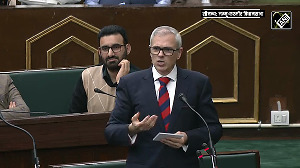Even through Civil Aviation Minister Praful Patel is moving keenly to allow foreign carriers pick up a 25 per cent stake in Indian airlines, analysts and industry experts say this will help mop up not more than Rs 1,000 crore (Rs 10 billion) -- which is only a fifth of the capital requirement of the industry, led by Jet Airways and Kingfisher Airlines.
The expected investment has been calculated on the basis of a 100 per cent premium on the current valuations of Jet Airways and Kingfisher -- two of the country's largest carriers by market share -- which require over Rs 5,000 crore (Rs 50 billion).
On Wednesday, Patel said the government might allow foreign airlines to take up to a 25 per cent placement in domestic carriers. Carriers, including British Airways, Lufthansa, Emirates, Singapore Airlines and Virgin Atlantic, are understood to have shown interest. Since the combined market capitalisation of Jet and Kingfisher is just above Rs 2,200 crore (Rs 22 billion), the 25 per cent placement is unlikely to garner slightly more than Rs 1,000 crore (Rs 10 billion) even after adjusting for a premium of around 100 per cent to the current market price.
Foreign carriers would attach higher valuations to Indian carriers than their current market capitalisation, going by their future business plans, which would include expansion of international operations.
SpiceJet, the third listed company which has raised $80 million from American investor Wilbur Ross, is unlikely to raise fresh funds in the immediate future. According to the data for December released by the civil aviation ministry on Wednesday, the three airlines together account for 62 per cent of the market. Discounting national carrier Air India, which is likely to get an equity infusion from the government soon, they control around 76 per cent of the market.
"Airlines need more than a billion dollars worth of capital, all of which cannot come through investment by foreign airlines. Given the market capitalisation of the two leading companies that stands at around Rs 2,000 crore (Rs 20 billion), the 25 per cent FDI will bring in around Rs 500-600 crore (Rs 5-6 billion)," said Nikhil Vora, managing director of brokerage firm SSKI Securities.
Added Mahantesh Sabarat of Mumbai-based brokerage firm Centrum Broking Pvt Ltd, "Taking a long-term perspective, the foreign airline investor, who is also a strategic partner, will look at the airlines' future plans. Enhanced international operations will automatically add a larger premium multiple associated with the valuation of an airline."
However, the Centre for Asia Pacific Aviation, in its recent market outlook, has estimated a potential investment of $1 billion going by the Indian airline industry's market valuation of $3-4 billion.
'The ability to acquire up to 25 per cent opens up the potential for direct investment of $750 million to $1 billion based on an industry valuation of $3-4 billion (excluding Air India). This does not necessarily reflect current valuations, but is indicative of the negotiated levels that the airlines may be targeting,' said the report, titled CAPA Outlook, 2009.
Going by a negative outlook for the next quarter, the net worth of the companies could be significantly eroded, going into a negative, which would dissuade international carriers.
According to statistics collected by the Business Standard research bureau, Jet Airways' net worth as on March 2008 stood at Rs 1,851.75 crore (approximatelt Rs 18.52 billion) after subtracting revaluation reserves and accumulated losses. Over the last two quarters, Jet has incurred accumulated losses of Rs 1,162 crore (Rs 11.62 billion). According to a Centrum report, Jet's passengers are expected to go down by 13 per cent in the fourth quarter of 2008-09 compared with the same period last year.
While Kingfisher Airlines' net worth could not be immediately ascertained, it incurred a loss of Rs 483.25 crore (approximately Rs 4.83 billion) for the quarter ended September 2008. Another dissuading factor would be the level of stake since the investor will get the right to block special resolutions only if he owns 26 per cent of an airline.
However, in the absence of any equity infusion from financial investors or a bailout from the government, the FDI would bolster the equity structure of the companies, thus deleveraging them to an extent.
Industry analysts with five brokerage firms, including Centrum, SSKI and CLSA, said Indian airlines companies are among the most over-leveraged in the world. "Most airline companies in India have a current debt-equity ratio of 4:1. For instance, Jet's debt as on March 2008 was three times its equity. We estimate it to grow to 4.6 times in March 2009 and 6.7 times in March 2010," said Sabarat.






 © 2025
© 2025